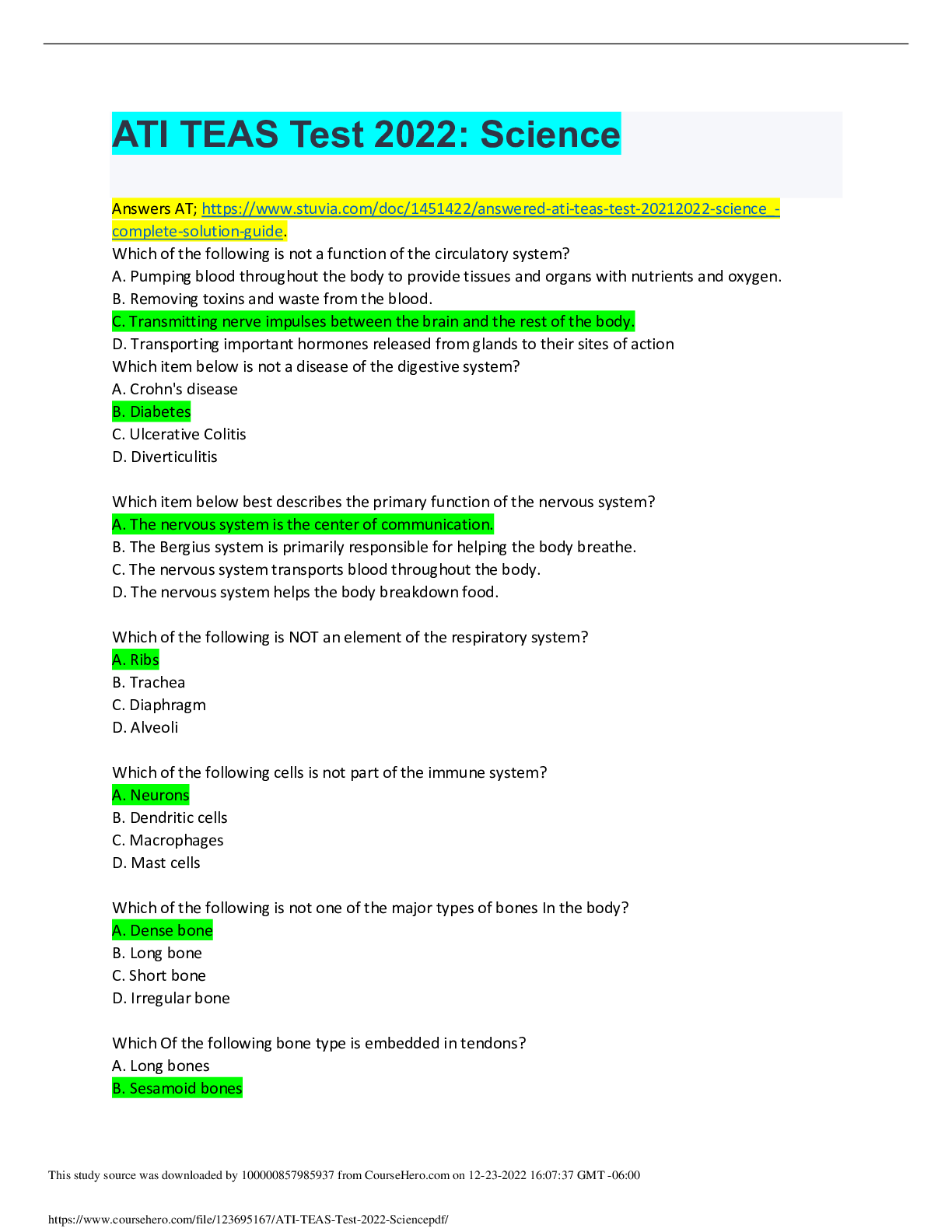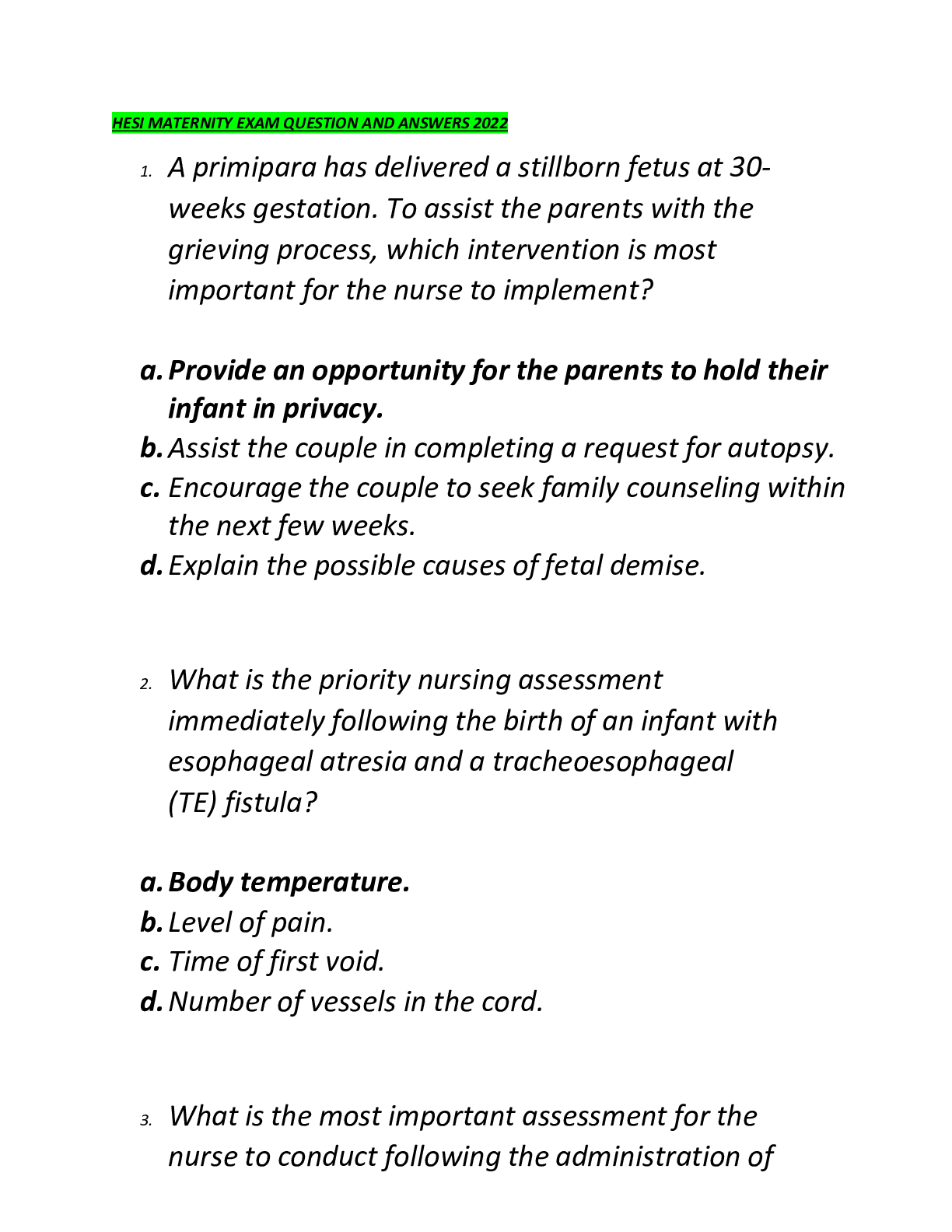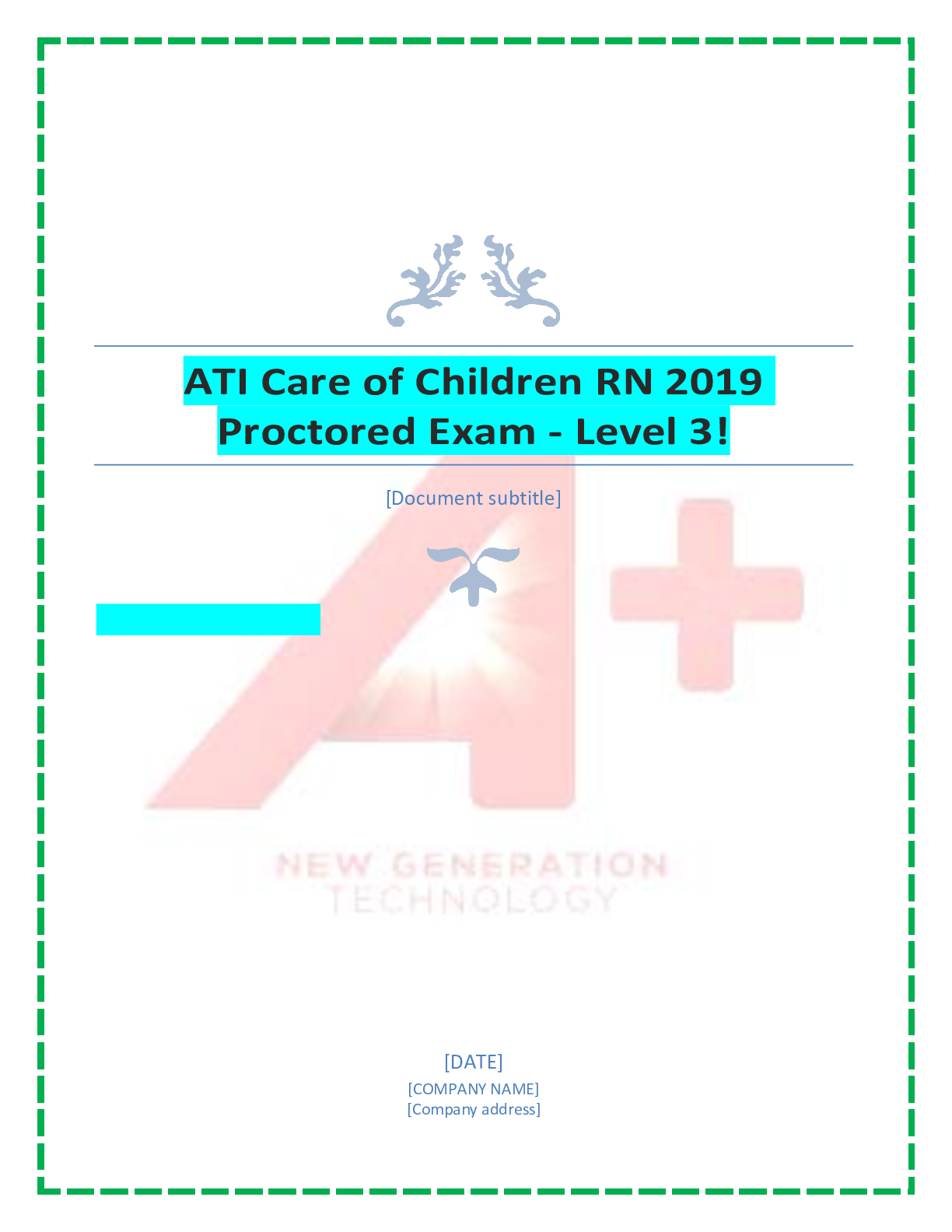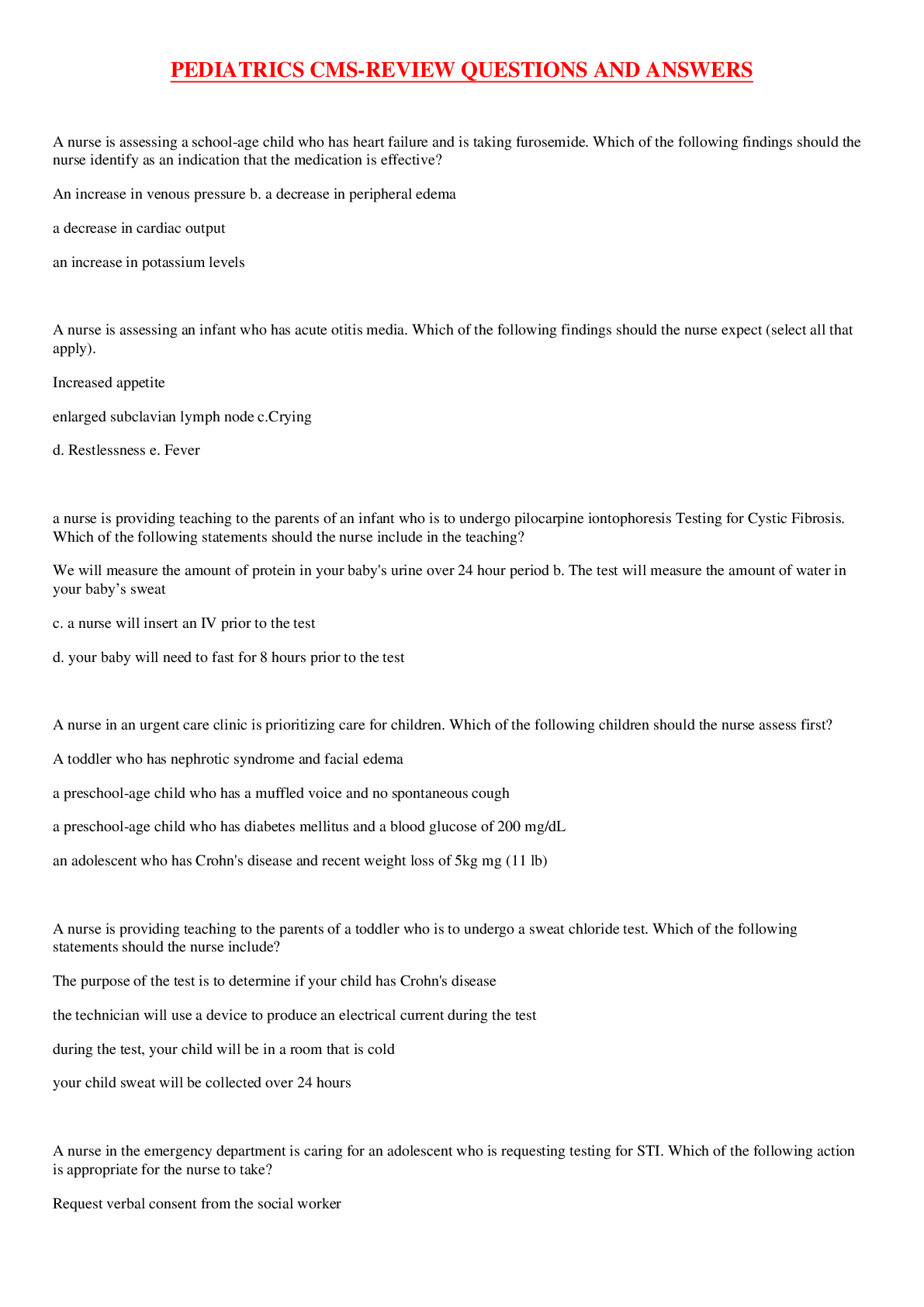ATI PN PHARMACOLOGY PROCTORED COMPLETE SOLUTION (Detail Solutions)
Document Content and Description Below
ATI PN PHARMACOLOGY PROCTORED COMPLETE SOLUTION (Detail Solutions) A nurse is providing nursing care to patients after completing a care plan from nursing diagnoses. In which step of the nursing pro... cess is the nurse? a. Assessment b. Planning c. Implementation d. Evaluation ANS: C Implementation, the fourth step of the nursing process, formally begins after a nurse develops a plan of care. With a care plan based on clear and relevant nursing diagnoses, a nurse initiates interventions that are designed to assist the patient in achieving the goals and expected outcomes needed to support or improve the patient’s health status. The nurse gathers data during the assessment phase and mutually sets goals and prioritizes care during the planning phase. During the evaluation phase, the nurse determines the achievement of goals and effectiveness of interventions. 2. The nurse is teaching a new nurse about protocols. Which information from the new nurse indicates a correct understanding of the teaching? a. Protocols are guidelines to follow that replace the nursing care plan. Protocols assist the clinician in making decisions and choosing b. interventions for specific health care problems or conditions. Protocols are policies designating each nurse’s duty according to c. standards of care and a code of ethics. Protocols are prescriptive order forms that help individualize the plan d. of care. ANS: B A clinical practice guideline or protocol is a systematically developed set of statements that helps nurses, physicians, and other health care providers make decisions about appropriate health care for specific clinical situations. This guideline establishes interventions for specific health care problems or conditions. The protocol does not replace the nursing care plan. Evidencebased guidelines from protocols can be incorporated into an individualized plan of care. A clinical guideline is not the same as a hospital policy. Standing orders contain orders for the care of a specific group of patients. A protocol is not a prescriptive order form like a standing order. 1 3. The standing orders for a patient include acetaminophen 650 mg every 4 hours prn for headache. After assessing the patient, the nurse identifies the need for headache relief and determines that the patient has not had acetaminophen in the past 4 hours. Which action will the nurse take next? a. Administer the acetaminophen. b. Notify the health care provider to obtain a verbal order. c. Direct the nursing assistive personnel to give the acetaminophen. Perform a pain assessment only after administering the d. acetaminophen. ANS: A A standing order is a preprinted document containing orders for the conduct of routine therapies, monitoring guidelines, and/or diagnostic procedures for specific patients with identified clinical problems. The nurse will administer the medication. Notifying the health care provider is not necessary if a standing order exists. The nursing assistive personnel are not licensed to administer medications; therefore, medication administration should not be delegated to this person. A pain assessment should be performed before and after pain medication administration to assess the need for and effectiveness of the medication. 4. Which action indicates a nurse is using critical thinking for implementation of nursing care to patients? Determines whether an intervention is correct and appropriate for the a. given situation Reads over the steps and performs a procedure despite lack of clinical b. competency c. Establishes goals for a particular patient without assessment d. Evaluates the effectiveness of interventions ANS: A As you implement interventions, use critical thinking to confirm whether the interventions are correct and still appropriate for a patient’s clinical situation. You are responsible for having the necessary knowledge and clinical competency to perform interventions for your patients safely and effectively. The nurse needs to recognize the safety hazards of performing an intervention without clinical competency and seek assistance from another nurse. The nurse cannot evaluate interventions until they are implemented. Patients need ongoing assessment before establishing goals because patient conditions can 2 change very rapidly. 5. A nurse is reviewing a patient’s care plan. Which information will the nurse identify as a nursing intervention? The patient will ambulate in the hallway twice this shift using crutches a. correctly. Impaired physical mobility related to inability to bear weight on right b. leg. Provide assistance while the patient walks in the hallway twice this c. shift with crutches. d. The patient is unable to bear weight on right lower extremity. ANS: C Providing assistance to a patient who is ambulating is a nursing intervention. The statement, “The patient will ambulate in the hallway twice this shift using crutches correctly” is a patient outcome. Impaired physical mobilityis a nursing diagnosis. The statement that the patient is unable to bear weight and ambulate can be included with assessment data and is a defining characteristic for the diagnosis of Impaired physical mobility. 6. A patient recovering from a leg fracture after a fall reports having dull pain in the affected leg and rates it as a 7 on a 0 to 10 scale. The patient [Show More]
Last updated: 2 years ago
Preview 1 out of 22 pages

Buy this document to get the full access instantly
Instant Download Access after purchase
Buy NowInstant download
We Accept:

Also available in bundle (1)

BUNDLE FOR ATI PN Pharmacology Review 2020/2021 EXAM [GRADED A}
ATI PN PHARMACOLOGY PROCTORED COMPLETE SOLUTION (Detail Solutions) ATI PN Pharmacology Review 2020/2021 EXAM [GRADED A}
By clairegrades 3 years ago
$14
2
Reviews( 0 )
$15.00
Can't find what you want? Try our AI powered Search
Document information
Connected school, study & course
About the document
Uploaded On
May 25, 2022
Number of pages
22
Written in
Additional information
This document has been written for:
Uploaded
May 25, 2022
Downloads
0
Views
133

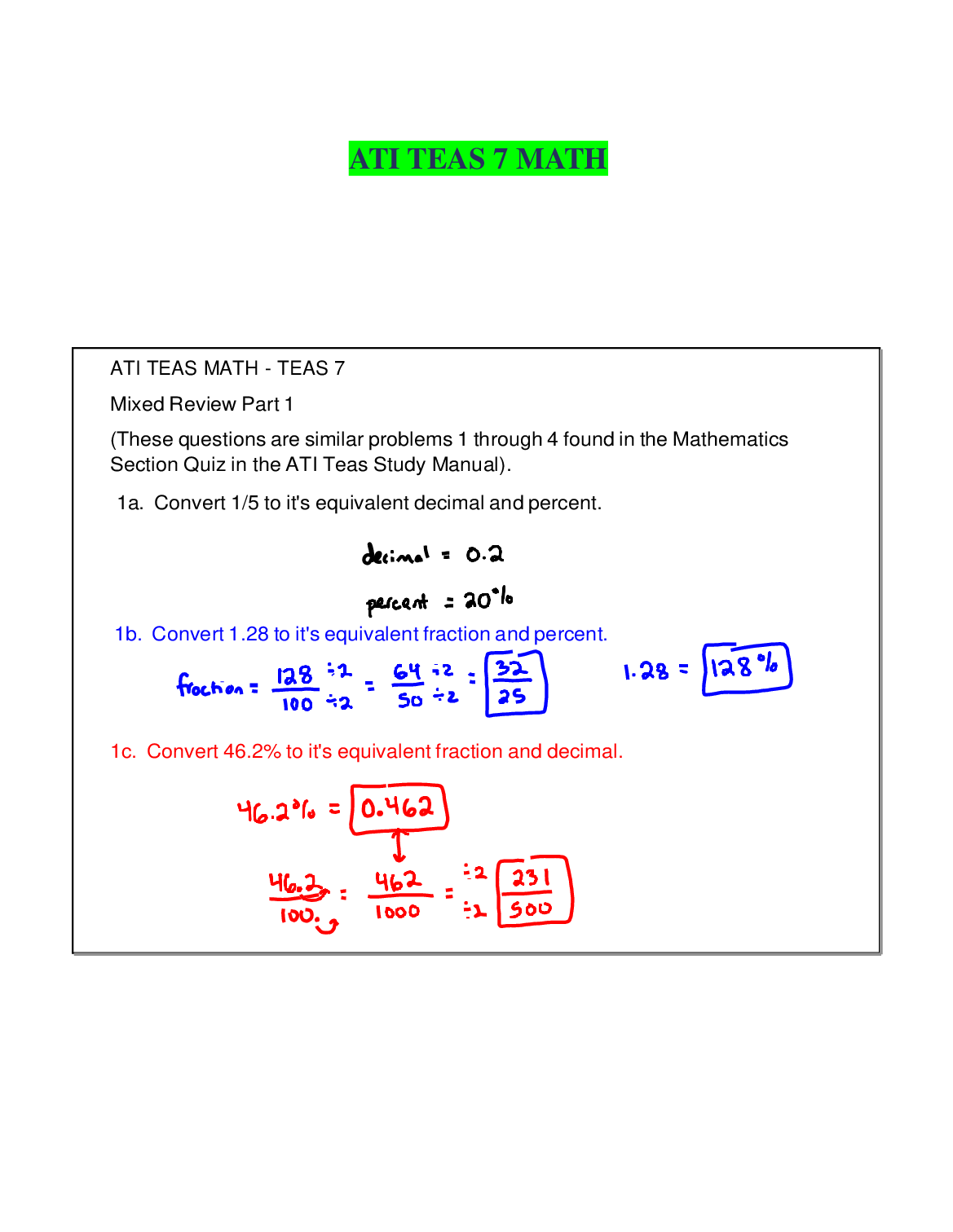
.png)
